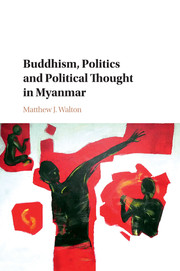Book contents
- Frontmatter
- Dedication
- Contents
- Acknowledgments
- A Note on Language and Usage
- Introduction
- 1 A Brief Political History and Cast of Characters
- 2 Building Blocks of a Moral Universe
- 3 On Human Nature and the Nature of Politics
- 4 Order and Freedom/Liberation: Purposes of Politics
- 5 What is “Politics” and What Constitutes “Participation”?
- 6 Discipline, Rights, and Morality: “Democracy” in Contemporary Myanmar
- Conclusion
- Appendix Glossary of Burmese and Buddhist Terms
- Bibliography
- Index
6 - Discipline, Rights, and Morality: “Democracy” in Contemporary Myanmar
Published online by Cambridge University Press: 22 December 2016
- Frontmatter
- Dedication
- Contents
- Acknowledgments
- A Note on Language and Usage
- Introduction
- 1 A Brief Political History and Cast of Characters
- 2 Building Blocks of a Moral Universe
- 3 On Human Nature and the Nature of Politics
- 4 Order and Freedom/Liberation: Purposes of Politics
- 5 What is “Politics” and What Constitutes “Participation”?
- 6 Discipline, Rights, and Morality: “Democracy” in Contemporary Myanmar
- Conclusion
- Appendix Glossary of Burmese and Buddhist Terms
- Bibliography
- Index
Summary
Chapter 2 began with a quote from a public sermon given by the Burmese monk Ashin Eindaga in 2011: “Democracy means acting in accordance with taya.” That chapter laid out the various elements of the moral universe that I argue gives necessary context to the monk's claim and allows for the navigation of multiple ways of understanding a notion such as taya. Here I return to the monk's idea to interpret it further and to compare it with other conceptions of democracy that circulate in contemporary Myanmar. Since the political transition installed a quasi-civilian government in March 2011, the rhetoric of political figures not only in the opposition but also from the government and military has been suffused with references to democracy, yet what these groups have in mind when they speak of democracy is sometimes less clear. Because these varied (and sometimes overlapping) Burmese conceptions of democracy do not always clearly map onto Western, English language democratic models, an understanding of the logical framework of the moral universe is necessary in order to fully appreciate their nuances and implications.
Political discourse in Burma during the first half of the twentieth century was lively, with people espousing varying conceptions of democracy, drawing from Buddhist teachings, Marxism and liberalism. In contrast, during almost fifty years of military rule, the authorities severely curtailed public discourse and debate; until 2011, Burmese people had limited opportunities and outlets to discuss their ideas about democratic politics. Those who have talked about democracy since the beginning of the twentieth century have drawn from Western models, emphasizing freedom, participation, and the protection of basic human rights. However, they have also crafted their arguments using Buddhist concepts and values, with some attempting to cast democratic practice as an inherent part of Buddhist teachings. Others have developed arguments to limit democracy, couched either in skepticism of the ability of people to effectively govern themselves (explored in the previous chapter) or concerns regarding the negative effects of too much freedom. Even those who have explicitly espoused a more secular democracy have usually done so in ways that I argue are consistent with the logic and reasoning of the Theravāda moral universe they inhabit.
- Type
- Chapter
- Information
- Buddhism, Politics and Political Thought in Myanmar , pp. 163 - 191Publisher: Cambridge University PressPrint publication year: 2016



